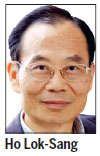The way the law works in China
Updated: 2014-10-28 07:24
By Ho Lok-Sang(HK Edition)
|
|||||||

A recent Wall Street Journal (WSJ) article made a distinction between the "rule of law" and "rule by law". These are indeed very different concepts. However, the assumption that China practices rule "by" law rather than the rule "of" law deviates from the spirit of the reform proposals implemented by the Fourth Plenum of the 18th Central Committee of the Communist Party of China (CPC).
The WSJ article cited Victor Mair, a professor of Chinese at the University of Pennsylvania, who referred to Hitler's Nuremberg Laws as an example of rule by law, "which were neither fair nor predictably applied". Mair further remarked that in China's courts, police and prosecutors are controlled by the CPC. He writes that the Constitution - which guarantees freedom of speech and religion, among other liberties, is shunted aside when it conflicts with Party interests. The assertion that the courts, police, and prosecutors are loyal to the CPC may be accurate. However, the statement "the Constitution ... has been shunted aside when it conflicts with party interests" is misleading and inaccurate. The main problem with this statement lies in the fact that the party identifies its interests with the interests of the people. There are no party interests beyond the interests of the people. The spirit of the proposed reforms lies - as President Xi Jinping has argued - in containing power within proper standards and procedures.
The spirit of the rule of law lies in the fact that "all are equal before the law" which means no one can be above the law. If anyone could be above the law, then this would be the rule of man. Outside of transparent standards and procedures, there cannot be the rule of law. China's reforms lie in establishing transparent standards and procedures. These are meant to bind everybody - regardless of their rank in the bureaucracy or the CPC. This is the same idea as that of the rule of law as it is meant to be applied in the West. In China, the Party is what is called a public tool (gongqi). Tools are, of course, used by people - so the Party is controlled by people. But if everybody is bound by the law, then a Party official can only use the authority of the Party in ways which adhere to the dictates of the law.
If the law is designed to serve the interests of the Party, yet the Party's interests are viewed as being identical to the interests of the people, then this is how things should be. There is nothing wrong. Professor Delury of Yonsei University is correct in saying that imperial China's ruling elite saw themselves as being above the law. This outdated view that the law should apply to others, but not to oneself, may still be held by some officials. This explains why Xi Jinping's ongoing reforms are necessary and will yield positive results.
"Ruling the country according to law" should not be interpreted as ruling it as one pleases. The leaders of the country are obliged to rule according to standards which are legislated as laws and judged to be in the interests of the people. The crux of the ongoing reforms lies in establishing these standards and ensuring they are credible in defending the interests of the people.
For example, recently a CCTV health program produced a report on censorship. This showed how the country can be properly ruled according to the law.
The health program was brought to the attention of the regulator - the State Administration of Press, Publications, Radio, Film and Television. They had been informed that some guests invited to discuss health issues might not be qualified healthcare professionals. The information they were providing may therefore be inaccurate. Moreover, personal or commercial interests could have been involved.
Because of these concerns, the authorities required guest speakers to be certified professionals who all had to go through a vetting procedure. So the WSJ article, when it referred to the "cage of Communist Party control", was wrong. For the party is under the control of people; it has the interests of the people at heart and provides clear standards and procedures to be followed. As a consequence, the "cage of Communist Party control" actually prevents abuses of power.
Some commentators note that by upholding the role of the Constitution, the Party is not undermining its own supremacy, but actually consolidating it. This is correct, but it is a positive development because the Party's "supremacy" is based on its legitimacy as defender of the interests of the people. This supremacy makes the Party more credible as a public tool and more effective as a ruling party. The rule of the law discourages officials from deviating from the law.
The political system of China is of course different from democracies in the West. But the rule of law is universal, as is human nature. Only by upholding the rule of law can the Party prevent abuses of power and achieve legitimacy as the party of the people.
The author is director of the Centre for Public Policy Studies at Lingnan University.
(HK Edition 10/28/2014 page10)